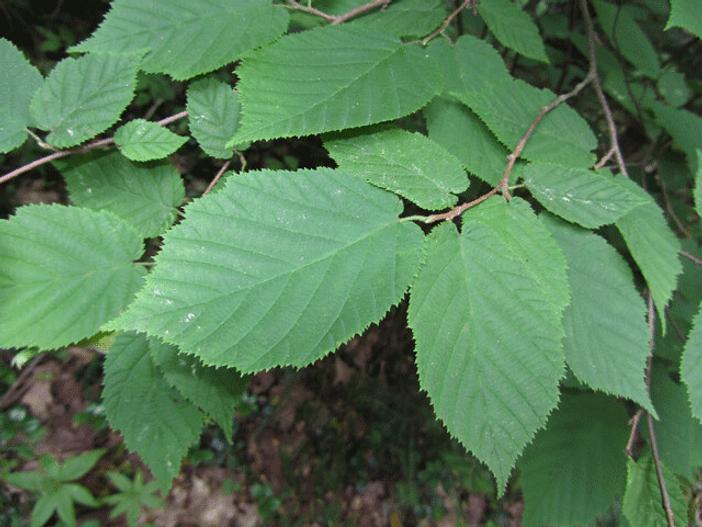Beaked Hazelnut
(Corylus cornuta)
Beaked Hazelnut (Corylus cornuta)
/
/

Homer Edward Price
CC BY 2.0
Image By:
Homer Edward Price
Recorded By:
Copyright:
CC BY 2.0
Copyright Notice:
Photo by: Homer Edward Price | License Type: CC BY 2.0 | License URL: https://creativecommons.org/licenses/by/2.0/ | Uploader: homeredwardprice | Publisher: Flickr



























































Estimated Native Range
Summary
Corylus cornuta, commonly known as Beaked Hazelnut, is a deciduous shrub or small tree native to a variety of habitats including mixed forests, forest edges, and riparian zones across the United States, particularly in the Great Lakes Region, and extending into Southern Canada. It typically reaches 4–8 meters (13–26 ft) in height and is characterized by its multiple trunks and smooth, gray bark. The male flowers are yellowish-brown catkins that form in the fall and pollinate the inconspicuous single female flowers in the spring, leading to the development of the distinctive beaked fruits by summer.
The Beaked Hazelnut is valued for its wildlife support, providing food for birds and mammals, and its edible nuts, which are a traditional food source. It is often used in naturalistic plantings, as a shrubby border, or for erosion control due to its dense root system. It is also appreciated for its adaptability to a range of light conditions, from full sun to part shade, and its ability to thrive in soils with medium drainage. While it is hardy and can withstand extreme cold down to −50 °C (−58 °F), it may suffer from Eastern Filbert Blight in some regions. Gardeners should be cautious as the husks of the nuts have tiny filaments that can irritate the skin.CC BY-SA 4.0
The Beaked Hazelnut is valued for its wildlife support, providing food for birds and mammals, and its edible nuts, which are a traditional food source. It is often used in naturalistic plantings, as a shrubby border, or for erosion control due to its dense root system. It is also appreciated for its adaptability to a range of light conditions, from full sun to part shade, and its ability to thrive in soils with medium drainage. While it is hardy and can withstand extreme cold down to −50 °C (−58 °F), it may suffer from Eastern Filbert Blight in some regions. Gardeners should be cautious as the husks of the nuts have tiny filaments that can irritate the skin.CC BY-SA 4.0
Plant Description
- Plant Type: Shrub, Tree
- Height: 5-15 feet
- Width: 4-8 feet
- Growth Rate: Moderate
- Flower Color: N/A
- Flowering Season: Spring, Winter
- Leaf Retention: Deciduous
Growth Requirements
- Sun: Full Sun, Part Shade
- Water: Medium
- Drainage: Medium
Common Uses
Bee Garden, Bird Garden, Butterfly Garden, Deer Resistant, Edible*Disclaimer: Easyscape's listed plant edibility is for informational use. Always verify the safety and proper identification of any plant before consumption., Erosion Control, Fire Resistant
Natural Habitat
Native to mixed forests, forest edges, and riparian zones
Other Names
Common Names: Beaked Filbert , Beaked Hazel , Western Hazel , Coudrier À Long Bec , Noisetier , Noisetier Long-Bec , Noisetier À Long Bec , Amerikansk Näbbhassel
Scientific Names: Corylus cornuta , Corylus cornuta f. cornuta , Rostella americana
GBIF Accepted Name: Corylus cornuta Marshall